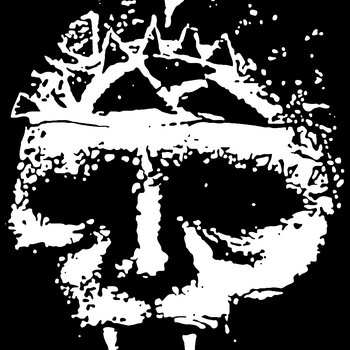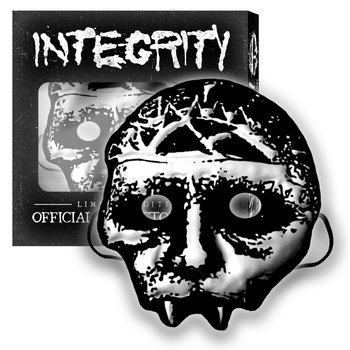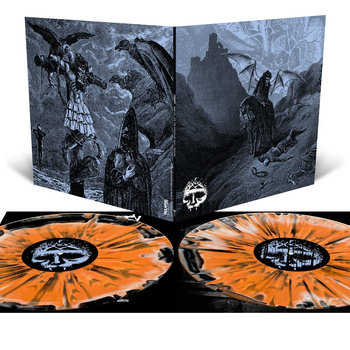
Dwid Hellion, the mastermind behind long-running Cleveland metallic hardcore band Integrity, is heavy duty. He’s about to release the band’s new album, Howling, For the Nightmare Shall Consume, and as one would imagine from its name, it’s not exactly light fare. The central concept of the album is that the renowned, troubled painter Francis Bacon gets sucked into a metaphysical realm and is dragged across eternity in order to bear witness to humanity’s continuing and unending disgrace. At each juncture, humanity is given the choice to behave less disgracefully; at every juncture, we fail.
The idea that humanity itself is a disease is something that Hellion has investigated since the band’s first full-length. Those Who Fear Tomorrow, released in 1991, combined punk and metal in new and brutal ways, and instilled it with Hellion’s metaphysical introspection. His thesis, developed across a string of ever more daring and bizarre albums, is that, well, humanity is the devil. (Sir David Attenborough, among other scientists, philosophers, and commentators, might agree. Hellion includes himself in this class of wretches, of course.) Over the course of their career, the band has explored death cults, mind control, and the concept that we might only exist as the projection of some other (possibly idiotic and/or chaotic) force.
Howling, For the Nightmare Shall Consume, which uses Bacon as a hierophant for this revelation, acts as a sort of capstone to this 26-year quest. Bacon is shown the light, and the light is not pretty. It’s fitting that the new album is the band’s most metallic to date, with guitarist Dom Romeo whipping ably between thrash, power metal, and stoner metal.
With this puzzle laid out before us, we spoke to Hellion about Francis Bacon, why humanity is so horrific, and his cool shoes.
A theme that recurs throughout Integrity’s discography is that humanity is a bad, diseased thing. In fact, this is one of the focal points of the new album.
Humanity is a plague or a disease, I would say. And I would like to put in the disclaimer that this opinion isn’t trying to change the world or save the world for positive reasons. I’m not saying things are bad and we should change it. That’s not my mission at all.
Fair enough. But, why do you think humanity is so wretched?
History. Modern and past history—as you can see as an American [laughs]. History proves, time and time again, that humanity is a disease and a virus that moves at great speeds to destroy not only itself, but everything around it.
But, you must understand that I’m not saying that’s a bad thing and I’m not trying to change it. I’m not trying to change the world. I’m trying to observe it.
I’m glad you say that, because that relates to one of the central points of the album. The artist Francis Bacon figures prominently in the album’s setting. He was famous for his distorted and ghoulish paintings. Do you feel some sort of kinship with Bacon?
I do feel a kinship with Francis Bacon. There is something about his personality that has always resonated with me. His paintings are very dark, skewed visions. They’re usually portraits of humans in everyday situations, but they appear as a deeper version of themselves. You can see a darker side of the individual coming through in the painting. With Bacon, you can’t say it’s surreal or abstract, but there is an abstraction.









T-Shirt/Apparel, 2 x Vinyl LP, Vinyl LP,




As I started to find more information about him, I found that he had a deep philosophy about life, and that became more of a connection for me than the paintings. It doesn’t dismiss the paintings. But, for me, I find his philosophy to be equally as important as the artwork itself—which I think is overlooked by people who speak about Bacon. That really resonated with me—the way he looked at life and humanity, and the way he lived his life.
You have a song on the album called ‘7 Reece Mews,’ which is where Bacon had his famously messy studio.
The song ‘7 Reece Mews’ is the address of the studio where he did most of his paintings. The idea is that there was a séance to end all séances, so to speak. How to word this…there’s a story that encompasses the entire new album. It all revolves around 7 Reece Mews. It’s not restricted to this story for each song, but the overall gist is that a young painter, Francis Bacon, who was an interior decorator at the time, rents this painting studio, and is going to try his hand at painting. He invites over his friends who were pretty wild, decadent types—extravagant and eccentric. On a whim, they decide to have a drunken séance, thinking that it would be a hoot.
Bacon is taken on a sort of Dickens-esque journey throughout time. Not in the ‘Ghost of Christmas Past’ style, exactly, but he visits different events of occult importance throughout his history. By witnessing and exploring and being enveloped in these events, when he returns to reality, he is cursed and blessed to see the demon within all humans, and his paintings become what they are today. However, I’m more interested in the abstract and poetic version—I’m not necessarily interested in laying the idea bare like that.
What is interesting about Bacon is that while he did have a very dismal view of the human race, he was quite the social guy—he loved to go out and party and was famous for gambling.
Well, how else would you deal with it? He could go out and try to save the world and make it a better place. And how successful can you be with that approach, anyway? How many people have tried in the past? None have been successful.
Dom Romeo [of Pulling Teeth and A389 Records] was your main collaborator on this album. Why did you decide to work with him?
I met Dom about 20 years ago. We became fast friends and we’ve been brothers since then. He knows what I’m working towards, and he’s close enough that he can tell me to fuck off…to a degree. That’s been beneficial. Conflicting ideas can create chaos and that creates the perfect environment for our music.
What do you like about his contributions?
I like his solos and use of unusual instrumentation. On ‘7 Reece Mews,’ he uses a lap steel guitar. That’s the instrument that you hear in a lot of sappy Country-Western tunes. It’s like a board and you lay it across your lap and you play it with a slide. I think that if someone else tried to do that, he or she might not be able to do it with subtlety. When we used these unusual instruments, we didn’t want it to scream, ‘Hey, there’s something unusual here!’ We want it to be part of the song. He is phenomenal at guitar solos and guitar acrobatics, like Randy Rhoads [who played with Ozzy Osbourne] or Randy Uchida [of G.I.S.M.], or any of the ‘80s cock rock guitar virtuosos, [who are] a big inspiration for both of us.







T-Shirt/Apparel, 2 x Vinyl LP, Vinyl LP,




Speaking of the instrumentation, throughout the album, we hear a sort of soulful wailing with the guitar. It reminded me of the blues.
I love the blues. That’s the music that I have the most passion for in my life—Delta blues. I grew up in Indiana on a farm-type setting. My grandmother was from Tennessee. I got a lot of inspiration from my grandmother’s life experiences and the things she grew up with. For me, the reason that it connected, it’s the most religiously freeing music that there is. Alan Lomax did field recordings of men in the chain gangs breaking rocks. When you hear those songs, you can tell these men are in hell, but they are singing their songs to escape their flesh prisons, and that is making them freer than any man outside of the physical walls could be. To me, that kind of escape is priceless. When I listen to that, I get goosebumps. I can feel the passion and freedom coming out of their voices—as well as their misery.
Certainly there is a connection between that concept, and the concepts heard in Integrity’s music—the idea of breaking the chain of being trapped in human existence if you will.
That is obviously my inspiration, and maybe that’s why music in stranger than contemporaries and why I am [a] black sheep [in hardcore].
See, I think you like being the black sheep.
I’m not aspiring to be assimilated into a group of people with the same thinking. I want the freedom to be able to think and believe without having a council of mind saying that it’s okay or it’s not okay. I have no aspirations to conform to any of that or be a part of any genre, so to speak.
What’s interesting about that is because you are a fairly divisive person, people will often follow trends you set—on purpose or not. For instance, and I find this fascinating about you, is that you are known for wearing Nike Air Jordans and a certain subset of punk fans have adopted this style.
I wear the same sneakers that I wore when I was a boy. As a young teenager, I was interested in skateboarding, and Nike made an Air Jordan 1 shoe. It was the perfect skateboarding shoe. Then, they made an Air Jordan 2 and Nike had a bunch [of Air Jordan 1s] overstocked, so they sent those to the discount stores. When it came time for my parents to buy me new shoes, we went to the discount store. And all the Air Jordan 1s were $10, and at the time, new sneakers were like $50 to $100 each. So I said to my father, ‘Look if you buy me 10 pairs of those shoes, you’ll never have to pay for another pair of shoes for the rest of my life,’ and he bought them and they lasted me until I was 25 or 26. Then, Nike reissued the shoes, and I bought them again.
I pretty much always dress the same way. I have this [style] and I don’t have to worry about a different wardrobe. It might be a mental illness. I have boxes and boxes of the same shoe stacked to the ceiling in my office.
What were your younger years like?
I was in La Fontaine, Indiana. James Dean was from about two miles north of La Fontaine. It’s mostly pig farmers and corn. I lived there with my grandparents. At the time, I liked it and I hated it. Something inside me wanted more action, more excitement, and more access to the world.
You were limited to your interaction with the outside world. It was a blessing, but at the time I hated it. You could go exploring, look at nature, go wandering, do some drawings… At the time you couldn’t go on the Internet late at night or whatever. I had to make my own entertainment. At the time, living in such isolation felt confining and miserable. Now as I look back on it, I long for that time and I miss it.
Indiana is often included in the ‘Bible Belt.’ Do you think the books of the Bible have an underlying truth to them?
I think there is some truth in everything. There was definitely some kind of flood. I think that a lot of the stuff is metaphorical or at least in Aesop [style], a lesson to be learned. You also have translation problems throughout time.
If you look at the Nag Hammadi scriptures—they talk about Genesis in a very different way than the Bible talks about Genesis. In that story, the serpent is the good guy, and God is the oppressor, and the snake is the one who frees man from being a naked pig…but are we free? Is it better to have the fucking minds that we have that cripple us? This intelligence that drives us crazy? I don’t know if it does.
Look at nature—it doesn’t behave the same way as we do. Something is very fucking wrong with us. To have conversations like this. To make expressive music or writing, it’s against nature itself. It doesn’t make any fucking sense. That that’s why we are a disease.
—John Gentile







